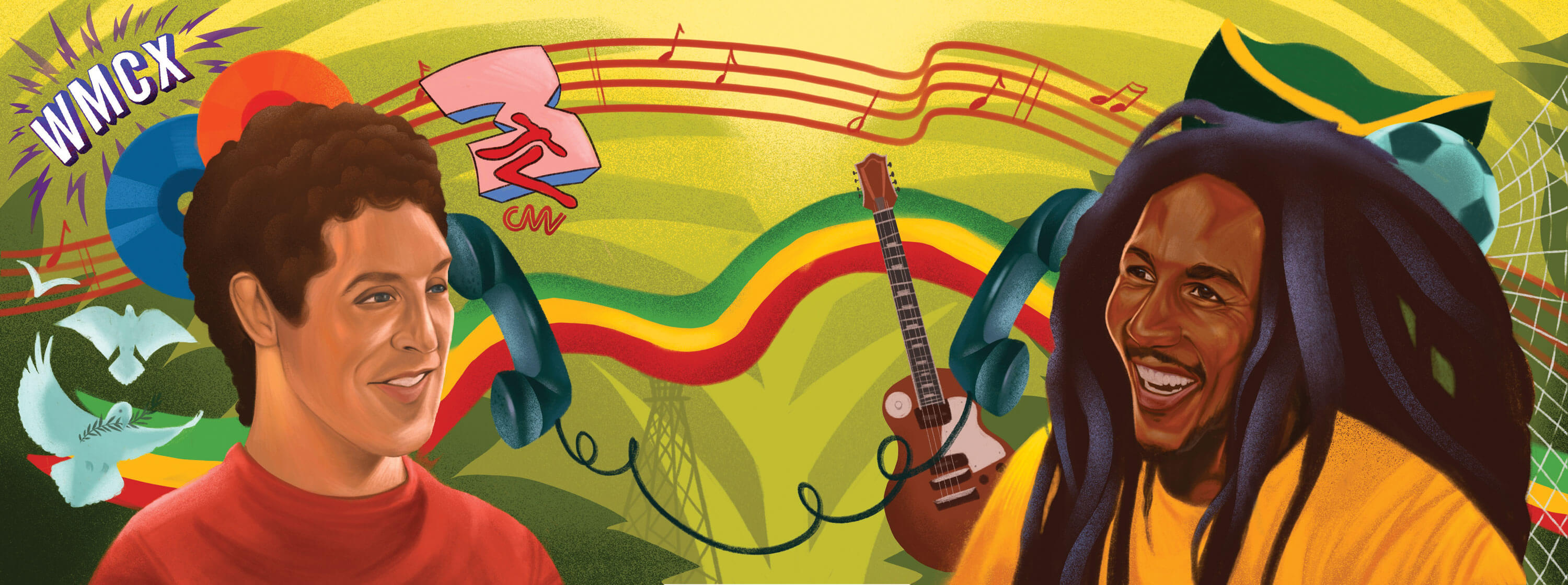
Marley & Me
Forty years ago this May, Bob Marley died, and Jeff Steinberg ’84 was the last person to interview the reggae legend. Here, he recounts the call and breaking the news on WMCX.
My connection to Bob was through my father, who was his longtime attorney and friend, so it wasn’t just luck that I tracked Marley down for my first interview as a freshman disc jockey.
By then, everybody knew Bob was sick. Most people knew the story: He had discovered acral lentiginous melanoma in his toe after a soccer injury in 1977 but didn’t want the toe amputated due to his Rastafarian faith, and the cancer eventually spread throughout his body.
Marley was in Germany receiving treatment for the cancer when I interviewed him. I was at home for Passover, and my father told me he would be talking to Bob and perhaps I could talk to him if he was willing. Bob didn’t want to talk to anybody at that point. So in the beginning of the recording you can hear my dad asking, and Bob says, “No, no, I’m all out of time.” My father persisted. “Please Bob, it will take just a few minutes, he’s all hooked up on the phone.” “OK,” Bob said, “Let’s hear what he have to say.”
I got on the phone and started firing away with my questions: Who created reggae music? “Reggae music was created through the environment.” Where is the Rastafarian movement headed? “Africa.” Do you enjoy any other kinds of worldly music? “I enjoy all music, but to tell you the truth I am not into the punk business, but I like some of the new wave music. I like the Police, some of the music of dem do.” What’s the message you are trying to portray in your music? “Peace, love, and harmony.” Before I knew it, the interview was over.
Fast-forward about two weeks. It’s Monday, May 11, and I’m back on campus studying for a final when I got a call from my father saying that Bob had died. I was incredibly sad, of course, but my first instinct was to run to the station. I kicked the disc jockey o the air and made the announcement at 9:25 a.m. “We have some really sad news to pass along,” I said. “I just found out that international recording star Robert Nesta “Bob” Marley, at the age of 36, has died this morning in Miami, Florida, with his family by his side, and we’re going to do a tribute and play Bob Marley music all day.” Then I played Redemption Song.
I didn’t think many people would be listening, but within minutes the phonelines lit up, and I remember thinking, “Oh no, I’m in trouble.” We were getting calls from the AP, CNN, and MTV. I talked with Pete Fornatale, the legendary disc jockey from WNEW in New York City. The wire services started reporting that WMCX had announced Marley’s death. At some point I picked up the phone, and it was my father on the other end. “What the bleep did you do?” he shouted. And I was like, “You didn’t tell me I couldn’t tell any- one!” The phones rang all day long.
I played reggae music well into the afternoon and aired parts of the interview, which ended up being Bob’s last, and is likely the last recording of his most precious and beautiful voice. At the end of my interview with him, I had asked him to say, “This is Bob Marley, and you’re listening to WMCX in West Long Branch,” which he did. But for me, the best part of that interview—then and now—is the end. After I hopped off the phone with Bob, he and my father had this beautiful exchange, and the last thing you hear on the recording is Bob faintly saying, “Good mon. Bye-bye.”